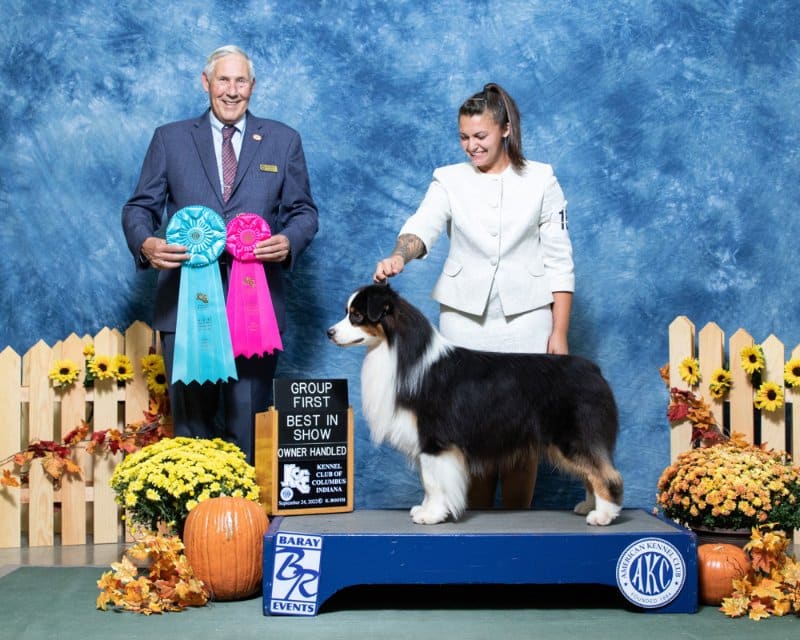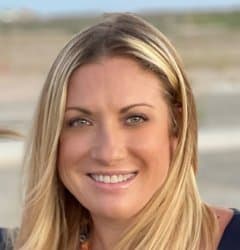By the time these words are published, the newness of 2023 will have worn off for most people. But as it is, these words are being written as the year is brand spanking new. I’ve spent the past few days pondering the phenomenon of the novelty that is “new” and what “new” means for dog show exhibitors.
There is often excitement surrounding advancements and opportunities that are new, but the new exhibitor is often harshly criticized for simply being new—even though there’s no instruction manual or handbook for newbies to follow. Newbies facing the new challenge of competing in dog sports are often filled with optimism, excitement, and anticipatory nerves. And how are newcomers received by those more experienced? More often than not, experienced exhibitors see newcomers as a neutral event instead of an exciting arrival.
Why is this? Honestly, I do not know why newcomers to dog sports are met with discouragement so often. However, there are exceptionally special newcomers who have figured out how to navigate their early days in dog sports and it seems to come right down to the people they meet, combined with tenacity, competitive spirit, and determination.
Meet Gabriella (Gabby) Thornburg. Gabby began showing in early 2021, and remarkably, her competition story starts with two breeds; Australian Shepherds and German Wirehaired Pointers. She clearly has studied the non-existent newbie handbook: work hard, get a mentor, learn the standard, get into the ring.
When I asked Gabby to share her introduction to exhibiting in Conformation with me for SHOWSIGHT, she gave me these exact words:
“I began showing dogs in early 2021.I worked extremely hard to learn as much as I could about Conformation, grooming, and the art of showmanship and was privileged enough to have a team of mentors willing to take me under their wings. I was absolutely hooked. Since then, I have continued to show and do sports with my main breed, Australian Shepherds, and have also begun showing and hunting with German Wirehaired Pointers.
My Australian Shepherd, GCH CH Bailiwick Audacious, “Audie,” has been the absolute best first show dog that I could ask for. I am very lucky to have the opportunity to share him with my mentors, Heather Herron and Heather Sells. Together, we have acquired multiple Herding Group wins, a Reserve Best in Show, multiple Owner-Handled Bests in Show, countless Owner-Handled Group wins/placements, finished our first full-year showing as a Top 3 Owner-Handled Australian Shepherd, and most importantly, have had the absolute time of our lives doing it all.”
[wonderplugin_3dcarousel id=64]
I think we can agree that a handler entering her third calendar year of exhibiting, with Group wins and RBIS and OH Top 3 under her belt, Mrs. Thornburg has done some things right. Yes, a newbie doing things right—lots of things. Gabby did have some advantages working in her favor during her first foray into Conformation; however, even with her leading edge she had challenges.
As someone coming from dog sports, Gabby admits it was hard to know where to start when it came to getting into Conformation. And this is someone with dog sport experience!
What breed should I get? Who can help teach me?
What skills should I prioritize, and what resources can I use to learn those things?
Gabby fully admits, “I had a lot of questions. Through my local Obedience club and attending a few shows, I was able to ask questions and be led to the right people. A huge challenge I had was learning to groom. I spent a few years as a pet groomer but grooming show dogs is totally different. It’s an art! I have spent hours talking to individuals about grooming and practicing these skills—and it’s still not even close to perfect!
Possibly the most common barrier to entry into the show world for people who are not “born into it” is finding good mentors. Mentors can not only help you with your first dog(s), but can be pivotal in someone’s career in Conformation. They can help you learn to show, evaluate, and select show dogs (really, future breeding stock), teach you ring procedure and common courtesies, and help you network your way into relationships with other important individuals in your breed. A good mentor means the difference between a lifelong dog enthusiast and someone who loses interest. In a sport that needs more newcomers, this feels extra important.”
So far, Gabby is following the non-existent newbie handbook to a ‘T’, right? In that case, getting a show dog was the logical next step.
Gabby continues, “I met the women who would become my mentors at my local training club. I was interested in several breeds and they helped me narrow down what I wanted. They offered to let me travel to shows with them. This experience was priceless. Helping and observing the entire process, from prep to grooming to being in the actual ring, helped me get comfortable. I was also able to help by taking dogs back in the ring for them. I think this time spent with my mentors/breeders helped to show intent, commitment, and willingness to work, and it helped them be more comfortable placing quality dogs with a “‘newbie.’”
And then what? Gabby must have breezed in and set the world on fire, right? Well, maybe not. Here’s where Gabby lays it out in a way that all (and none) of us want to hear.
Gabby’s newcomer expert advice? “PATIENCE! Once you know what you want, it’s so hard to wait… but good things come to those who are patient. The right mentors, the right breeders, the right DOG will come with time. I cannot stress enough that being willing to wait—and spend that time learning—is a HUGE key to getting a successful show dog, especially the first one.”
I’m sure there are those who will say that due to her rapid success, Gabby doesn’t know what patience really looks like. Why? My assumption is that in the dog world, patience is often measured in decades and generations, not in years or months.
With that in mind, Gabby is quick to give credit to her community of breeders/mentors:
“I attribute much of my early success to having a wonderful team of teachers supporting me. My Australian Shepherd breeders, Heather Sells and Heather Herron (Northbay/Xsell Aussies), and other members of their team such as Tracy Blackford have been wonderful teachers.
It’s essential to get a dog that is a quality representative of your breed if you want to be successful. For this reason, it is important to be patient when you are building relationships, learning, and seeking a show dog (see below). Good things can take time.
Most important is being willing to LISTEN and take criticism. This sport is extremely complicated and takes a lot of work. The people involved in your breed, and those in the Conformation world in general before you, are a wealth of information. Any opportunity I have to do better, to ask someone with more experience a question, and to learn, I take. I think this has been a big part of being successful so soon.”
Gabby also offers the following points which I recommend taping to the fridge for future reminder:
“I spend a lot of time at a dog show even if I’m not showing. If I show early, I stay and watch other breeds, and I stay and watch the Groups. I approach others who are showing dogs or breeds. I am interested in (when they are not too busy) and ask questions. This time to watch and observe those with more experience is a completely underrated opportunity to absorb information. You can wander the grooming area at a show and learn at least one new grooming technique every single time.
Watching other breeds and the Group/Best in Show ring is a chance to see great handlers. What do they do with an excitable dog? How do they handle a strong dog? How do they help make things fun for the bored dog? What grooming techniques are they doing ringside to make sure their dog looks its best? There is an impossible amount of things to learn about presenting a dog successfully. If you just show up, show your dog, and go home, you miss out on a big change to learn some of those things.”
Things like:
Kindness and Good Sportsmanship
“Being kind goes a long way. People want to help if you are kind, willing to help, and friendly. Being a good sportsman even when you lose is a hard-learned lesson but an important one, and people will respect you for these things.”
Networking
“This is a sport of knowing people. You never know who you can help, who can help you, who will become a lifelong friend, and who you can learn from. I think that being willing to talk to people and ask questions, even if they seem silly at the time, is what got me into this sport and is definitely a huge component to having early success.”
Having Fun
“Why do this if we don’t enjoy it? Learn, appreciate a beautiful dog, do your best, and have fun. The rest will come.”
The rest will come. The newness will wear off. I consulted the non-existent newbie handbook, and unfortunately, it does not address how or when the rest will come. But if it were to exist, I’m sure the handbook would encourage us to embrace the newbie, be open to anticipating what the newbie might be able to do, and encourage the newbie to get out there and try. By doing so, another new person just might have early success similar to that of Gabby and her mentors.









